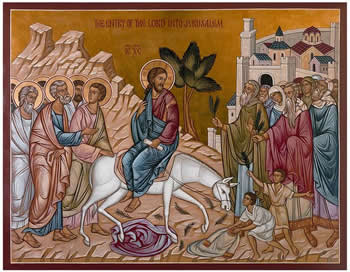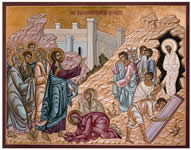|
|||
|---|---|---|---|
| This weekly bulletin insert complements the curriculum published by the Department of Christian Education of the Orthodox Church in America. This and many other Christian Education resources are available at http://dce.oca.org. | |||

Children scrambling up trees to cut branches they will wave, people spreading their garments in the road for the King to ride on and shouting, "Hosanna!" These are the joyful images of welcome we associate with the Entrance of Christ into Jerusalem. Yet we know that in a few days, some of the same spectators who shouted their welcome will clamor for Christ to be crucified and the robber Barabbas to be released. When the King turns out not to be just the kind of leader they wanted, they will be ready to turn on Him, craving something or someone else. They remind us of the Hebrew people making their way to the Promised Land with Moses leading them. Liberation from Egyptian bondage, in the midst of the wilderness they are traversing, is no longer the cause for celebration it had been in the first flush of freedom. They lament, "We remember the fish we ate in Egypt, for free, the cucumbers, the melons, the leeks, the onions, and the garlic; but now our strength is dried up, and there is nothing at all but this manna to look at" (Numbers 11: 5-6). The Church remembers two saints who, like Moses, had to deal with people who were no longer satisfied with what God was giving and revealing to them. Saint Zeno of Verona was born in the mid-fourth century in Syria. He traveled widely, visiting monasteries as went, and settled in Italy. After some time he was chosen to be bishop of the city of Verona. Zeno lived during the consecutive reigns of two emperors who embraced Arianism. He was persecuted for refusing to accept the novel Arian idea that "there was a time when the Son was not" or in other words a time when He did not yet exist. Zeno courageously insisted in his writings and teaching that Jesus Christ, the only-begotten Son of God, existed before all ages. He was adamant in declaring that this is God's revelation, and therefore can't be altered.
Basil, Bishop of Parium, lived in the eighth century as the controversy over icons was reaching a fever pitch. Saint Basil refused to put his signature to the documents abolishing the veneration of icons. Like Saint Zeno he was faithful to the Church's teaching. Also like Saint Zeno he suffered at the hands of those who were offended by his adherence to God's revelation. What will we be doing as the Great and Holy Pascha approaches? We can pine for something other than what God is giving, like the complaining Hebrews, or we can form our own ideas of what He should be giving, like the Arians and iconoclasts. But we can also choose, instead of either of these, to rejoice in His Resurrection and accept it as His incredible gift. We can continue "like the children with the palms of victory" to sing Hosanna to Him as Lord and Savior. |
|||

